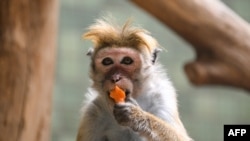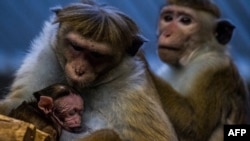Sri Lankan Agriculture Minister Mahinda Amaraweera's announcement that authorities were considering exporting 100,000 endangered toque macaque monkeys to a private Chinese company has sparked protests from animal rights activists.
While the toque macaque, which is endemic to Sri Lanka, features in the International Union for Conservation of Nature red list of endangered animals, it is not a protected species in Sri Lanka.
Amaraweera said last week the Chinese proposal to import the toque macaques for more than 1,000 of the country's zoos was being evaluated by a government-appointed expert committee.
Conservationists and animal rights activists warned, however, they do not believe the Chinese zoos have space for 100,000 toque macaques and that it was more likely the monkeys would be used for testing in labs.
Sri Lankan authorities say farmers view the roughly 3 million toque macaques in Sri Lanka as a menace because they damage crops.
"Toque monkeys are the foremost among the animals that cause crop damage in this country. All the efforts made by the government so far to reduce its population have failed," Amaraweera said.
Activists fear monkeys will land in labs
The Agriculture Ministry said last week that exporting the toque macaques might reduce the excessive population, but conservationists have criticized the move, with many expressing fear the animals may be used for tests in labs.
Four conservation groups — Wildlife & Nature Protection Society, Center for Environmental Justice, Federation of Environmental Organizations, and Rally for Animal Rights and Environment Sri Lanka — said in a statement last week there are only 18 Chinese zoos fitting the "globally accepted criteria" of a zoo.
"This averages out at 5,000 macaques per zoo. This is not credible," the statement said.
"Macaques, with their human-like qualities have been particularly popular, especially with medical testing facilities in the U.S. and Europe. The potential income from such a trade would be far greater than that from the sale of this species to zoos," the statement continued.
The name of the Chinese company that sent the request for the toque macaques is Zhejiang Wuyu Animal Breeding Co. Ltd., and it has not issued any kind of a reply regarding the issue.
In a statement issued Wednesday, though, the Chinese Embassy in Sri Lanka said the government agency that manages the import of wild animals in China was "not aware of the request [from China] and has not received such application from any side."
The claim that the Sri Lankan monkeys could be used for "experimental purpose" was "disinformation," it contended.
"The Chinese government always attaches great importance to wildlife protection and actively fulfill international obligations, which makes China one of top countries in the world in terms of wildlife protection legislation and law enforcement," the embassy statement added.
Panchali Panapitiya, executive director of Colombo-based Rally for Animal Rights and Environment said it is "obvious that this company has plans to supply the monkeys to animal testing labs."
"Even if the toque macaques are sent to 1,000 zoos, as the Sri Lankan Minister of Agriculture claims, each zoo would have 100 monkeys. Have you ever seen a zoo housing 100 monkeys of the same species? The claim that these animals are going to zoos lacks credibility," Panapitiya told VOA.
"We believe, these monkeys will land in the labs where they will be burnt with chemicals and poisoned with toxins. And they will die untimely and painful deaths," she said.
Expert calls proposal 'reprehensible'
Bangalore-based primatologist Anindya Sinha asserted the Chinese proposal is "reprehensible on ethical grounds."
"Can one even imagine the trauma that these individual macaques would undergo if they are indeed caught and transported? Family groups would be torn asunder, and many individuals will needlessly die in transit," Sinha who has studied toque macaques in Sri Lanka, said.
The ecological consequences of exporting such a huge number of toque macaques out of Sri Lanka would be enormous, Sinha noted.
"What we worry about most is that the toque macaque populations could crash, never to recover again," he said.
"We hope the Sri Lankan authorities will see the light of reason, recognize the enormity of the repercussions of this act — ethically, morally, nationally and ecologically — and unconditionally refuse to comply with this offer."










